The Strategic Plan 2035 serves as the blueprint for the next decade of growth at Keck Graduate Institute. As KGI further develops into a preeminent graduate university in the nation, this roadmap paves our path to sustainability and growth.
First announced at President Mohamed Abousalem's inaugural Fall Welcome Address in 2024, the Strategic Plan 2035: Elevating Excellence Together was officially launched at the 2025 Fall Welcome Address on August 28, 2025. The plan focuses on four priority areas (themes): Advance Academic Excellence, Enhance the Student Experience, Accelerate Institutional Maturity, and Elevate the KGI Brand.
Provost and Vice President of Academic Affairs Megan Prosser chaired the Strategic Planning Committee, as well as four working groups – one for each priority area – and broad representation from KGI stakeholders. For each of the four priority areas, a set of strategic outcomes were defined with three sets of goals – 3-year, 5-year, and 10-year – driving defined key performance indicators (KPIs). It is anticipated that goals will be completed by the designated time point or sooner. Given the 10-year period of the plan, the strategic outcomes and goals may need to be recalibrated to account for the changing external environment, competitive intensity, and internal conditions.
If you have any questions about the strategic plan, please email stratplan@kgi.edu.
Our Mission, Vision and Values
As part of our strategic plan, KGI re-evaluated its mission, vision and values to ensure the plan aligns with who we are.
Our Mission, Vision, and ValuesPlanning Process
The strategic process involved gathering community input from all stakeholders including administration, faculty, staff, students, Board of Trustees (BOT), advisory board members, alumni, and industry partners through a variety of in-person and virtual meetings and surveys. This input was distilled by the Strategic Planning Committee and then further refined by the Theme Teams. Another round of community input was obtained on the emerging strategic outcomes and goals for finalization by the Strategic Planning Committee to develop a draft plan. The University Leadership Council (ULC) then finalized the plan.
Plan Structure
The Strategic Plan 2035 is developed to be KGI’s roadmap for the next decade. For each of the four priority areas (themes), a set of strategic outcomes were defined with three sets of goals – divided into 3-year, 5-year, and 10-year – driving defined key performance indicators (KPIs). It is anticipated that goals will be completed by the designated time point or sooner. Given the 10-year period of the plan, the strategic outcomes and goals may need to be recalibrated to account for the changing external environment, competitive intensity, and internal conditions.
Key Performance Indicators (KPIs)
- Employee Satisfaction: Employee perception of morale, workplace culture, communication, recognition, and professional growth experience - employee surveys and employee retention.
- Enrollment: Ability to attract, enroll, and retain high quality students in alignment with institutional mission, capacity, and financial goals - total headcount, new student enrollment, enrollment by program, yield rate, strength of applications, retention rate, physical and programmatic capacity, and enrollment established through international partnerships.
- Financial Sustainability: Ability to balance revenues and expenses, maintain healthy reserves, invest in long-term priorities, and manage financial risks over time in alignment with strategic goals - endowment growth, revenue diversification, operating margin, composite financial index, cash flow, and debt service ratio.
- Graduate Earnings/Placements: Proportion of graduates employed or pursuing further education within a defined time after graduation, and their median or average earnings - employment rate, median starting salary, salary growth after 5 years, internship-to-employment conversion, employer satisfaction score, and quality of job or higher education placements.
- Industry and Clinical Partnerships: Strength of external partnerships to provide students with hands-on, real-world experience to prepare students for professional practice and workforce readiness - partner satisfaction, renewal of partnership agreements, and number of available internships and rotation sites.
- Rankings and Reputation: Standing in academic, professional, and public spheres as reflected by third-party rankings, peer assessments, media visibility, and stakeholder perceptions - earned media, national/global rankings, program-specific rankings, and brand awareness index.
- Research Awards and Expenditures: Scale, competitiveness, and impact of the research enterprise - journal citations, journal publications, total annual research awards, total annual research expenditures, and indirect cost recovery rate.
- Student Satisfaction: Student perception of their academic experience, campus environment, and institutional support - student surveys and alumni engagement.
The Plan (Download the Strategic Plan)
To ensure academic programs continue to align with and advance industry; grow KGI’s research enterprise and corporate engagement endeavors; and establish and expand faculty development opportunities to drive long-term excellence in teaching, learning, and research.
By 2035, these efforts will lead to:
- A flexible, innovative, and inclusive academic experience that responds to the evolving landscape of higher education
- Increased enrollment in high demand programs, leading to a minimum of 1000 students enrolled
- Enhanced job placement and graduate earnings as assessed by program benchmarks
- Exceed 80% student satisfaction as determined by the exit survey
- A nationally and internationally recognized faculty community distinguished by continuous growth, interdisciplinary leadership, and real-world impact
- Achievement of Carnegie R2 research status
- Increased acquisition of federal, state, foundation, and corporate research grants leading to $30M in annual revenue
- Growth in intellectual property
- 50% increase in high-impact journal publications and 100% increase in journal citations
- Growth in international academic and research collaborations and revenue
| Strategic Outcomes | KPIs | 3-year Goals | 5-year Goals | 10-year Goals |
|---|---|---|---|---|
| Strengthen academic innovation, market relevance, and institutional reach |
|
|
|
|
| Enhance faculty development with real-world integration |
|
|
|
|
| Grow the research enterprise |
|
|
|
|
| Increase national and global engagement |
|
|
|
|
* Denotes responsible owner
To expand holistic student support — academic advising, career services, and mental health support; build and nurture an ecosystem that facilitates innovation and entrepreneurship; and create a lifelong engagement strategy for students and alumni.
By 2035, these efforts will lead to:
- KGI ranked as an institution that provides a welcoming and supportive campus to all students
- Student belonging and support at KGI will exceed national norms
- Improved student engagement with and sense of belonging to The Claremont Colleges
- 75% of students participating in student-led orgs, affinity groups, mentorship programs, or campus events
- 90% of students securing employment within six months of graduation or enrollment in an advanced degree program or professional training within 12 months of graduation, supported by robust professional development infrastructure
- 20% of alumni participating in meaningful ways with the institution—through philanthropic contributions, volunteering, event attendance, or active communication
- Maintaining impressive graduation and retention rates that exceed national norms
| Strategic Outcomes | KPIs | 3-year Goals | 5-year Goals | 10-year Goals |
|---|---|---|---|---|
| Expand holistic student support that promotes a culture of belonging and well-being |
|
|
|
|
| Grow career and professional development pathways |
|
|
|
|
| Foster lifelong student-alumni community |
|
|
|
|
* Denotes responsible owner
To elevate KGI’s culture of continuous improvement to optimize admissions processes and increase enrollment; expand long-term partnerships with domestic and international academic institutions and corporate entities; and grow KGI’s philanthropic operations.
By 2035, these efforts will lead to:
- Financial sustainability evidenced by consistent year-over-year operating surpluses
- Scalable systems and policies that accommodate 2000+ students
- 95% of institutional policies up to date on an ongoing basis
- 90% employee satisfaction
- 90% employee retention
- Campus Master Plan can accommodate 2000+ students with optimal space utilization
- Modern, universal design, and sustainable facilities reflect KGI’s mission and strategic growth
- The physical environment enhances recruitment, retention, and institutional reputation
- Campus planning is fully integrated into the strategic and budget cycles
- Endowment growth to $100M
- Achievement of capital campaign goal
- Endowment growth through targeted campaigns
| Strategic Outcomes | KPIs | 3-year Goals | 5-year Goals | 10-year Goals |
|---|---|---|---|---|
| Establish a culture of enhanced data-driven operations |
|
|
|
|
| Employee growth, equity, and retention |
|
|
|
|
| Align fiscal and physical infrastructure with institutional vision |
|
|
|
|
| Fuel fundraising and philanthropic growth |
|
|
|
|
* Denotes responsible owner
To grow the Institute's young brand and bring KGI to the world, elevating students, faculty, staff, and graduates and supporting academic excellence, industry partnerships, and philanthropy. Advance shared goals under one shared vision and create a culture that celebrates collective success.
By 2035, these efforts will lead to:
- Increased application and yield rate across programs, leading to a minimum of 1000 students enrolled
- Inclusion and improvement in reputable rankings
- Increase in earned media hits/year and mentions in local outlets
- Amplified presence, awareness, and recognition by prospective students, industry, employers, local community, and the general public.
- Expansion of industry and clinical partnerships with increased renewal rates across all business units
| Strategic Outcomes | KPIs | 3-year Goals | 5-year Goals | 10-year Goals |
|---|---|---|---|---|
| Unify and Strengthen KGI’s brand identity and recognition by the global community |
|
|
|
|
| Showcase KGI’s value and impact on education, healthcare, and society |
|
|
|
|
* Denotes responsible owner
Implementation and Assessment Plan
Each of the initiatives has an owner designated in the plan. In addition, each priority will have an implementation team chaired by a Cabinet member and co-chaired by University Leadership Council member. The implementation team rosters can be viewed in Appendix 3. The implementation team will track progress on initiatives for the designated priority. Divisional strategic plans will also be developed in alignment with the Elevating Excellence Together! Institutional strategic plan (for instance the School-specific, RISE, ACE, and Belonging and Engagement strategic plans). The President’s Office will provide a yearly report of strategic planning progress at the Annual Fall Address. As the Elevating Excellence Together! plan comes to an end, planning will commence for Strategic Plan 2045 in 2033.
Strategic Planning Committee
Committee Chair
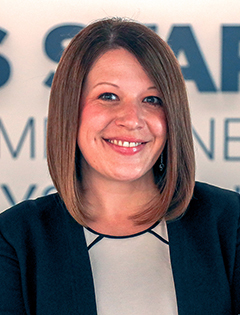
Megan Prosser
Provost and Vice President of Academic Affairs
Advance Academic Excellence Co-Chairs
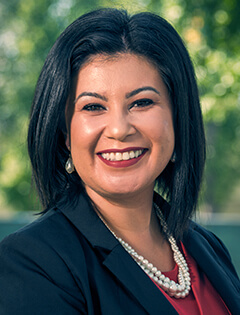
Stephanie Kourtakis
Assistant Professor of Clinical Sciences
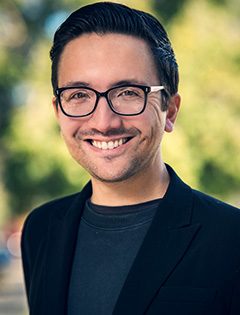
Ryan Mahler
Instructional Designer
Enhance the Student Experience Co-Chairs
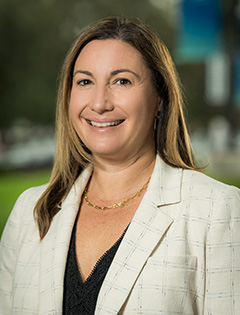
Kelly Auld-Wright
Assistant Professor, Occupational Therapy
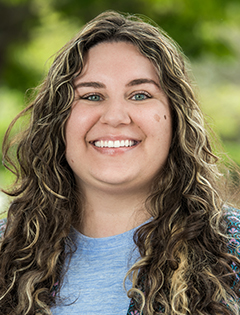
Danielle Lombardi
Associate Director of Student Wellness
Accelerate Institutional Maturity Co-Chairs
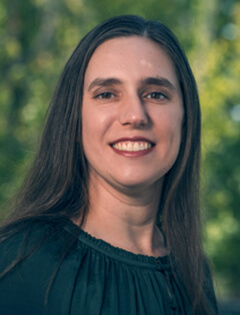
Barbara Fortini
Program Director, MSGDA and Associate Professor of Genetics
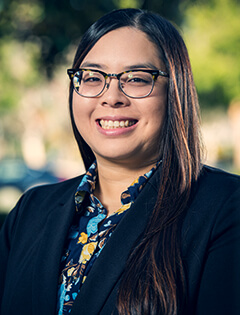
Jacquelyn Lau
Human Resources Generalist and HRIS Analyst
Elevate the KGI Brand Co-Chairs
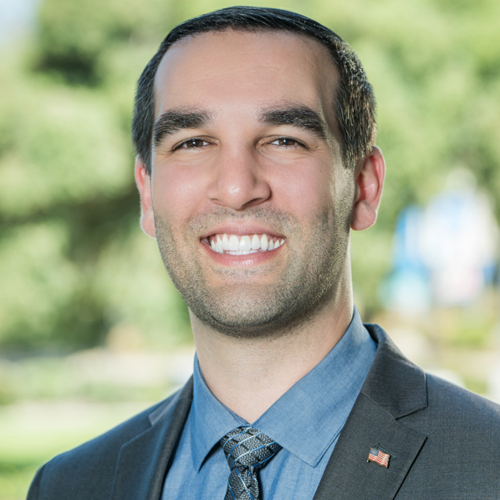
Ken Mashinchi
Vice President of Marketing and Communications
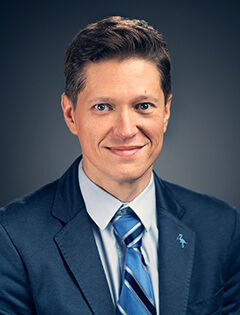
Maxim Polonsky
Assistant Professor, Marketing
Christine Ashikyan, Director, Office of Research and Sponsored Projects (ORSP)
Erin Gysbers, Assistant Professor, MSPA
Jeniffer Hernandez, Associate Professor of Immunology
Rebecca Herrera, President, Student Government
Johnny Lacey, Director, Recruitment and Outreach
Katrina Minor, Workplace Experience Coordinator
Yolanda Moses, KGI Trustee
Emir Osmanagic, Bioscience Industry Advisory Board (BIAB) member
Michelle Pilch, Executive Assistant to the Provost
Erin Quillen, Assistant Vice President, Financial Operations and Business Systems
Jennifer Rangel, Registrar
Rahul Singhvi, KGI Trustee
Thomas Tredennick, MBS '10